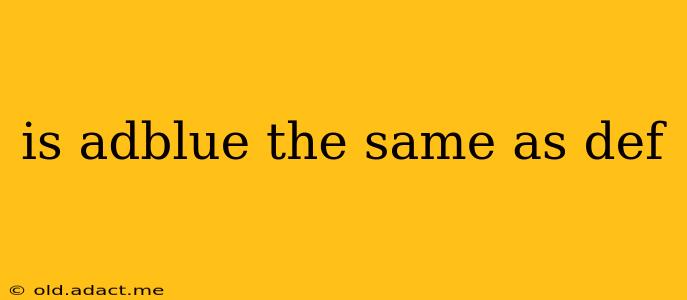The short answer is yes, AdBlue and DEF (Diesel Exhaust Fluid) are essentially the same thing. They are both aqueous urea solutions used in selective catalytic reduction (SCR) systems to reduce harmful nitrogen oxide (NOx) emissions from diesel engines. However, AdBlue is a registered trademark of the German chemical company VCI, while DEF is the more general term referring to the fluid itself. Think of it like Kleenex and tissues—Kleenex is a brand, while tissue is the product category.
What is AdBlue/DEF?
AdBlue/DEF is a colorless, non-toxic fluid composed of 32.5% high-purity urea and 67.5% deionized water. This specific ratio is crucial for its effectiveness in the SCR system. The urea reacts with the NOx in the exhaust gases, converting them into harmless nitrogen, carbon dioxide, and water. This process significantly reduces the environmental impact of diesel vehicles.
How Does AdBlue/DEF Work?
The SCR system injects AdBlue/DEF into the hot exhaust gases upstream of a catalyst. The heat causes the urea to decompose into ammonia (NH3), which then reacts with the NOx in the presence of the catalyst. This catalytic conversion transforms the harmful NOx into less harmful substances.
Why is the exact 32.5% urea concentration crucial?
The precise 32.5% urea concentration is critical because it ensures optimal performance and prevents issues such as ammonia slip (unconverted ammonia escaping into the atmosphere) or catalyst poisoning. Variations in the concentration can significantly impact the effectiveness of the SCR system.
What Happens if I Use the Wrong Fluid?
Using the wrong fluid in your vehicle's SCR system can have serious consequences. Using anything other than AdBlue/DEF can damage the SCR system, leading to costly repairs. It can also hinder the system's ability to reduce NOx emissions, resulting in environmental damage and potentially failing emissions tests. Always use only the fluid specified by your vehicle's manufacturer.
Where Can I Buy AdBlue/DEF?
AdBlue/DEF is widely available at many truck stops, gas stations, and auto parts stores. Look for clearly labeled containers that meet the ISO 22241 standard. This standard ensures that the fluid meets the required purity and concentration specifications.
Can I refill my AdBlue/DEF tank myself?
Yes, most vehicles have readily accessible AdBlue/DEF tanks, and refilling is usually a straightforward process. However, it's always advisable to check your vehicle's owner's manual for specific instructions and safety precautions.
Is AdBlue/DEF Harmful?
AdBlue/DEF is generally considered non-toxic and environmentally friendly when used correctly. However, contact with skin or eyes should be avoided, and accidental ingestion should be addressed immediately by seeking medical advice. It's important to handle and store the fluid according to the manufacturer's instructions.
What are the environmental benefits of using AdBlue/DEF?
The primary environmental benefit of AdBlue/DEF is the significant reduction in NOx emissions from diesel engines. NOx is a major contributor to smog and acid rain, so reducing these emissions significantly improves air quality and protects the environment.
In conclusion, while AdBlue is a brand name and DEF is a generic term, they both refer to the same urea-based fluid essential for reducing NOx emissions in modern diesel vehicles. Understanding its importance, proper usage, and environmental benefits is crucial for responsible vehicle ownership.
